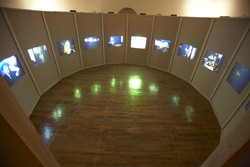Fassbinder
Berlin Alexanderplatz
21 Oct 2007 - 21 Jan 2008
P.S.1 Contemporary Art Center presents in collaboration with Kunst-Werke (KW) Institute for Contemporary Art, Berlin and the Media Department at The Museum of Modern Art, the first U.S. gallery exhibition that will feature the newly restored version of Rainer Werner Fassbinder's monumental, sequential film Berlin Alexanderplatz (1980). Based on Alfred Döblin's 1929 novel, this recently restored epic will be a long overdue introduction of a masterpiece of German cinema to a younger American audience. The more than 15-hour epic will be divided into 14 screening rooms, one for each episode of the film. This exhibition will be on view in the Third Floor Main Gallery from October 21, 2007 through January 21, 2008.
The parallel screening of all the episodes in one place will highlight Fassbinder's impressive visual idiom and his artistically challenging, freely innovative use of images. It will enable visitors to choose their own mode of approach to Berlin Alexanderplatz: they can divide its unusual length up into pieces, watch episodes several times, or return to the exhibition whenever they like, as the entrance ticket entitles holders to repeated visits. Additionally, all 14 episodes will be shown successively, in chronological order and in permanent loop on a large central screen. Stills from the film's 224 scenes will also be on display along with a first ever reproduction of Fassbinder's storyboard and his personal copy of Döblin’s Berlin Alexanderplatz featuring his written remarks. The exhibition will also feature excerpts from the audiotapes on which Fassbinder dictated the script for his 15-hour epic.
Rainer Werner Fassbinder (1945–1982) was a leader of the New German Cinema movement. Political and social corruption in postwar Germany was a primary theme in his work. Hailed as a cult hero during his life, he was a prolific filmmaker, having directed more than 40 productions including Love is Colder than Death (1969), Ali: Fear Eats the Soul (1973), The Marriage of Maria Braun (1979), Lola (1981) and Querelle (1982).
Fassbinder: Berlin Alexanderplatz is curated by Klaus Biesenbach, Chief Curator of the Department of Media at The Museum of Modern Art and P.S.1 Chief Curatorial Advisor, with the valuable assistance of Jenny Schlenzka.
The exhibition is accompanied by a catalogue edited by Klaus Biesenbach, with essays by Susan Sontag and Rainer Werner Fassbinder as well as 570 color film stills, the complete screenplay, biography, bibliography, and filmography.
The exhibition is supported by Mrs. Stephen M. Kellen and The International Council of The Museum of Modern Art.
The accompanying publication is made possible by The Contemporary Arts Council of The Museum of Modern Art, Terri and Timothy Childs, and the Rainer Werner Fassbinder Foundation.
Fassbinder: Berlin Alexanderplatz - An Exhibition ran from March 18 through May 13 2007 at KW Institute for Contemporary Art and was funded by the Kulturstiftung des Bundes/ German Federal Cultural Foundation.
Fassbinder: Berlin Alexanderplatz is presented as a part of Carnegie Hall's first major international festival−Berlin in Lights−a 17-day celebration of the city of Berlin that will run from November 2−18, 2007, with close to 50 events presented throughout all five boroughs of New York City, at Carnegie Hall, and partner venues. For more information about Berlin in Lights, please visit carnegiehall.org/berlininlights.
The parallel screening of all the episodes in one place will highlight Fassbinder's impressive visual idiom and his artistically challenging, freely innovative use of images. It will enable visitors to choose their own mode of approach to Berlin Alexanderplatz: they can divide its unusual length up into pieces, watch episodes several times, or return to the exhibition whenever they like, as the entrance ticket entitles holders to repeated visits. Additionally, all 14 episodes will be shown successively, in chronological order and in permanent loop on a large central screen. Stills from the film's 224 scenes will also be on display along with a first ever reproduction of Fassbinder's storyboard and his personal copy of Döblin’s Berlin Alexanderplatz featuring his written remarks. The exhibition will also feature excerpts from the audiotapes on which Fassbinder dictated the script for his 15-hour epic.
Rainer Werner Fassbinder (1945–1982) was a leader of the New German Cinema movement. Political and social corruption in postwar Germany was a primary theme in his work. Hailed as a cult hero during his life, he was a prolific filmmaker, having directed more than 40 productions including Love is Colder than Death (1969), Ali: Fear Eats the Soul (1973), The Marriage of Maria Braun (1979), Lola (1981) and Querelle (1982).
Fassbinder: Berlin Alexanderplatz is curated by Klaus Biesenbach, Chief Curator of the Department of Media at The Museum of Modern Art and P.S.1 Chief Curatorial Advisor, with the valuable assistance of Jenny Schlenzka.
The exhibition is accompanied by a catalogue edited by Klaus Biesenbach, with essays by Susan Sontag and Rainer Werner Fassbinder as well as 570 color film stills, the complete screenplay, biography, bibliography, and filmography.
The exhibition is supported by Mrs. Stephen M. Kellen and The International Council of The Museum of Modern Art.
The accompanying publication is made possible by The Contemporary Arts Council of The Museum of Modern Art, Terri and Timothy Childs, and the Rainer Werner Fassbinder Foundation.
Fassbinder: Berlin Alexanderplatz - An Exhibition ran from March 18 through May 13 2007 at KW Institute for Contemporary Art and was funded by the Kulturstiftung des Bundes/ German Federal Cultural Foundation.
Fassbinder: Berlin Alexanderplatz is presented as a part of Carnegie Hall's first major international festival−Berlin in Lights−a 17-day celebration of the city of Berlin that will run from November 2−18, 2007, with close to 50 events presented throughout all five boroughs of New York City, at Carnegie Hall, and partner venues. For more information about Berlin in Lights, please visit carnegiehall.org/berlininlights.

